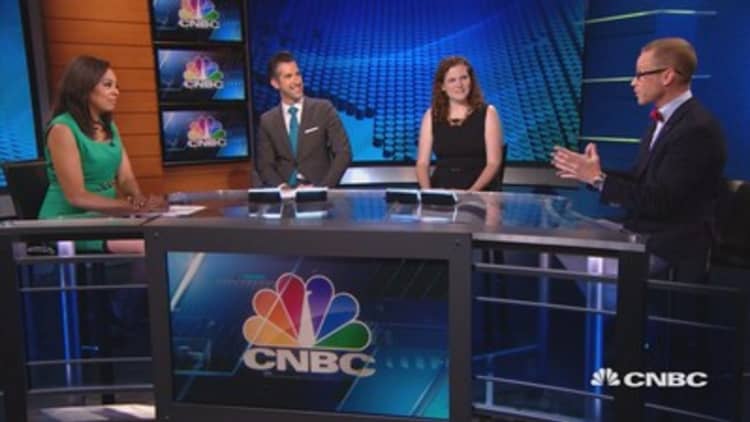
The standard advice from financial advisors to 20-somethings is to invest as much as they can in stocks—regardless of periodic market swings, however wild, like those seen over the past few days—and watch long-term compounding do its magic for the next 40-plus years.
But millennials, the 80-million-strong generation born between 1980 and 2000, don't seem to be getting the message. A slew of surveys show that these young 'uns aren't putting much faith in the stock market. Bankrate's Money Pulse survey from April, for example, shows that just 26 percent of people under age 30 own stocks. An earlier Bankrate survey revealed that young people prefer cash as the best way to hold the money they need for the long term.
"A huge number of them are opting out of stocks," said Claes Bell, a banking analyst with Bankrate. "This is a big deal."
Baby boomers—closest to retirement—are twice as likely to own stocks, Bell said.
Read MoreLive blog: The latest on latest market rout
"That's the disturbing part, because it's time that makes [investing] worthwhile," Bell said.
Experts worry that millennials, in particular, have a lot to lose by sitting on the sidelines. Not only will they miss out on years of compounding growth, Bell noted, but they may also be facing a more precarious retirement than older generations, with both Social Security and Medicare expected to be depleted in the next decade and a half.
Dealt a bad hand
The list of reasons why millennials have a distaste for stocks is long. First, they witnessed two big market drops—the dot-com bust of 2000 to 2001 and the financial crisis of 2008 to 2009. Many watched their parents struggle with layoffs and home foreclosures.
Older millennials started their careers in an abysmal job market while also being saddled with crushing student loans. And when they were ready to start their own households, they were met with an unaffordable rental and home-purchase market.
Read MoreAre millennials more risk-averse?
"The collision between this generation's expectations and reality is going to be problematic," noted Jean Twenge, professor of psychology at San Diego State University and author of "Generation Me: Why Today's Young Americans Are More Confident, Assertive, Entitled—and More Miserable Than Ever Before."
No wonder many think the markets are stacked against them, observers say.
Most millennial clients don't have many assets to manage, so charging assets under management isn't going to compensate the advisor.Ben Wacekfounder of Wacek Financial Planning
"The financial crisis left me thinking these people—and I have no idea who they are—are taking money from people and playing this game with it," said Timothy Sossa, 25, a high school history teacher in Springfield, Massachusetts.
Though he's distrustful, Sossa invests about $400 a month in a moderate allocation portfolio in a 403(b) plan through his school, but "the only reason I'm remotely invested in stocks is because it's required that I invest it," he said. However, he rarely looks at his account and admits he doesn't understand what's in his portfolio.
Altering the approach
Because millennials have such a different view of investing than earlier generations, advisors may have to figure out a different way to work with them, starting with the notion of risk.
Certified financial planner Joe Pitzl, a partner at Pitzl Financial, for example, doesn't push his young clients into stocks right from the start.
"To be a heavy equity investor, you have to behave like one," he said. There's little to be gained by pushing young investors into aggressive portfolios if they'll bail at the first whiff of trouble.
Read More
Instead, he recommends the opposite of the asset-allocation rule of thumb, which generally follows that young investors can tolerate risk better than older ones. Initially, he puts young investors into a 50/50 split between stocks and bonds, boosting their equity stake only after they've weathered a bear market or two.
Kendra Thompson, head of North American wealth and asset management for management consulting, technology services and outsourcing firm Accenture, said financial advisors need to adopt many more of these new approaches, including how advisors communicate.
Rethinking fees
She points to a practice called "tool convergence" that young investors, in particular, insist on.
"The tools the advisor uses and the tools the investor sees should be one and the same," Thompson explained. "The idea that the advisor shouldn't have access to information I don't see is new."
Nowhere is this debate being waged more than around fees. The new crop of digital investment advisors—often called robo-advisors—has put pressure on advisor fees, especially for smaller accounts. Robo-advisors are able to create a customized portfolio and monitor and rebalance it for a fraction of what human advisors charge.
Read MoreRetirement savings tactics explained
To appeal to millennials, said Thompson, advisors need to give them something more than asset-allocation advice. "Millennials really want cash-flow advice, but that's not the way that most investment advisors work," Thompson said.
Some are shifting away from the traditional 1 percent fee for assets under management.
"Most millennial clients don't have many assets to manage, so charging assets under management isn't going to compensate the advisor," said Ben Wacek, a CFP and founder of Wacek Financial Planning. "But by using a retainer, advisors are able to still be compensated.
"The monthly retainer makes sense to them," he added. "So many things are available on a monthly subscription basis: a gym membership, Netflix."
Wacek, a member of the XY Planning Network, all of whom offer retainers to clients, charges $50 to $200 a month, depending on the complexity of the client's needs. About half of his clients use it.
Read MoreWill Gen Y have to fund for itself?
Also on the decline with traditional brokerages, said Accenture's Thompson, is a graduated pricing model where investors receive less advice at a lower price point when their accounts are small but move toward more advice—and pay more for it—as their balances grow.
"Wirehouses are making their entry models much more compelling," she said. "You can't bank that everyone is going to move into your more profitable model, so you have to make sure each model is profitable."
—By Ilana Polyak, special to CNBC.com




